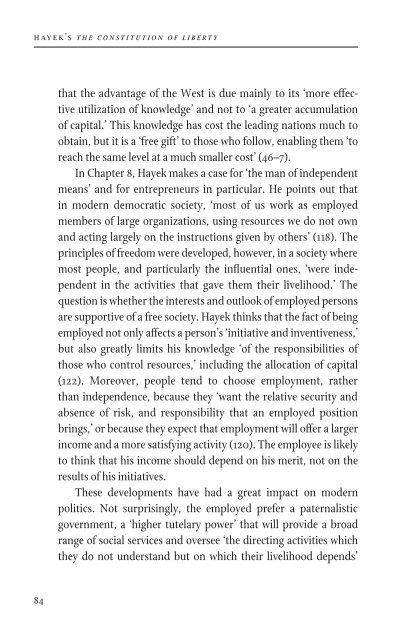Hayek's The Constitution of Liberty - Institute of Economic Affairs
Hayek's The Constitution of Liberty - Institute of Economic Affairs
Hayek's The Constitution of Liberty - Institute of Economic Affairs
You also want an ePaper? Increase the reach of your titles
YUMPU automatically turns print PDFs into web optimized ePapers that Google loves.
h ay e k ’ s t h e c o n s t i t u t i o n o f l i b e r t y<br />
e q ua l i t y, f r e e d o m a n d j u s t d i s t r i b u t i o n<br />
that the advantage <strong>of</strong> the West is due mainly to its ‘more effective<br />
utilization <strong>of</strong> knowledge’ and not to ‘a greater accumulation<br />
<strong>of</strong> capital.’ This knowledge has cost the leading nations much to<br />
obtain, but it is a ‘free gift’ to those who follow, enabling them ‘to<br />
reach the same level at a much smaller cost’ (46–7).<br />
In Chapter 8, Hayek makes a case for ‘the man <strong>of</strong> independent<br />
means’ and for entrepreneurs in particular. He points out that<br />
in modern democratic society, ‘most <strong>of</strong> us work as employed<br />
members <strong>of</strong> large organizations, using resources we do not own<br />
and acting largely on the instructions given by others’ (118). <strong>The</strong><br />
principles <strong>of</strong> freedom were developed, however, in a society where<br />
most people, and particularly the influential ones, ‘were independent<br />
in the activities that gave them their livelihood.’ <strong>The</strong><br />
question is whether the interests and outlook <strong>of</strong> employed persons<br />
are supportive <strong>of</strong> a free society. Hayek thinks that the fact <strong>of</strong> being<br />
employed not only affects a person’s ‘initiative and in ventiveness,’<br />
but also greatly limits his knowledge ‘<strong>of</strong> the responsibilities <strong>of</strong><br />
those who control resources,’ including the allocation <strong>of</strong> capital<br />
(122). Moreover, people tend to choose employment, rather<br />
than independence, because they ‘want the relative security and<br />
absence <strong>of</strong> risk, and responsibility that an employed position<br />
brings,’ or because they expect that employment will <strong>of</strong>fer a larger<br />
income and a more satisfying activity (120). <strong>The</strong> employee is likely<br />
to think that his income should depend on his merit, not on the<br />
results <strong>of</strong> his initiatives.<br />
<strong>The</strong>se developments have had a great impact on modern<br />
politics. Not surprisingly, the employed prefer a paternalistic<br />
government, a ‘higher tutelary power’ that will provide a broad<br />
range <strong>of</strong> social services and oversee ‘the directing activities which<br />
they do not understand but on which their livelihood depends’<br />
(123). <strong>The</strong>y are attracted to the idea that the state, in taxing and<br />
in providing services, should aim for social justice. <strong>The</strong>y come to<br />
regard persons who make their living by employing capital as a<br />
privileged class or special interest ‘which can justly be discriminated<br />
against’ (123). Little do they realise that their own opportunities for<br />
employment ultimately depend on ‘the existence <strong>of</strong> independent<br />
individuals who can take the initiative in the con tinuous process <strong>of</strong><br />
re-forming and redirecting organizations’ (124).<br />
Men <strong>of</strong> independent means are essential to preserving<br />
competitive enterprise, but their most important contribution to<br />
a free society is the leadership they provide, especially ‘in the field<br />
<strong>of</strong> cultural amenities, in the fine arts, in education and research,<br />
in the preservation <strong>of</strong> natural beauty and historic treasures, and<br />
above all, in the propagation <strong>of</strong> new ideas in politics, morals,<br />
and religion’ (125). From this standpoint Hayek defends not only<br />
entrepreneurs, but also a leisured class, whose members likely will<br />
have grown up to appreciate non-material goods and also to feel<br />
an obligation to take the lead in intellectual, moral and artistic<br />
affairs. In most <strong>of</strong> the USA, this class has almost completely disappeared,<br />
so that businessmen now lack intellectual leadership and<br />
have no ‘coherent and defensible philosophy <strong>of</strong> life.’ A progressive<br />
society requires ‘a cultural elite within the propertied class’<br />
(128–9).<br />
Merit and value<br />
Hayek’s underlying concern in Chapter 6 is the problem <strong>of</strong> distributive<br />
justice. Already he has shown that government must not,<br />
as a matter <strong>of</strong> law, distribute goods to persons according to the<br />
principle <strong>of</strong> equality. This leaves open, however, the possibility<br />
84<br />
85












